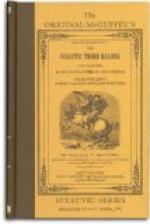12. Or how wilt thou say to thy brother, Let me pull out the mote out of thine eye; and, behold, a beam is in thine own eye? Thou hypocrite, first cast out the beam out of thine own eye; and then shalt thou see clearly to cast out the mote out of thy brother’s eye. * * *
13. Ask, and it shall be given you; seek, and ye shall find; knock, and it shall be opened unto you: for everyone that asketh, receiveth; and he that seeketh, findeth; and to him that knocketh, it shall be opened. Or what man is there of you, whom if his son ask bread, will he give him a stone? Or if he ask a fish, will he give him a serpent?
14. If ye then, being evil, know how to give good gifts unto your children, how much more shall your Father which is in heaven give good things to them that ask him? Therefore all things whatsoever ye would that men should do to you, do ye even so to them; for this is the law and the prophets. * * *
15. Whosoever heareth these sayings of mine, and doeth them, I will liken him unto a wise man, which built his house upon a rock: and the rain descended, and the floods came, and the winds blew, and beat upon that house; and it fell not; for it was founded upon a rock.
16. And everyone that heareth these sayings of mine, and doeth them not, shall be likened unto a foolish man, which built his house upon the sand: and the rain descended, and the floods came, and the winds blew, and beat upon that house; and it fell: and great was the fall of it.
17. And it came to pass, when Jesus had ended these sayings, the people were astonished at his doctrine: for he taught them as one having authority, and not as the scribes.
Definitions.—l. Dis-ci’ple, one who receives instruction from another. 2. Bless’ed, happy. In-her’it, to come into possession of. 5. Re-vile’, to speak against without cause. Per’se-cute, to punish on account of religion. 6. For-swear’, to swear falsely. 9. De-spite’ful-ly, maliciously, cruelly. 10. Pub’li-cans, tax collectors (they were often oppressive and were hated by the Jews). 11. Mete, to measure. Mote, a small particle. 12. Hyp’o-crite, a false pretender. 17. Scribes, men among the Jews who read and explained the law to the people.
Exercises.—Who delivered this sermon? Who are blessed? and why? Is it right to swear? How should we treat our enemies? Should we judge others harshly? What does Jesus say of him who finds faults in his neighbor, but does not see his own? What is said about prayer? About our conduct to others?
LXXIV. THE YOUNG WITNESS. (207) By S. H. HAMMOND.
1. A little girl nine years of age was brought into court, and offered as a witness against a prisoner who was on trial for a crime committed in her father’s house.
2. “Now, Emily,” said the counsel for the prisoner, “I wish to know if you understand the nature of an oath?”




